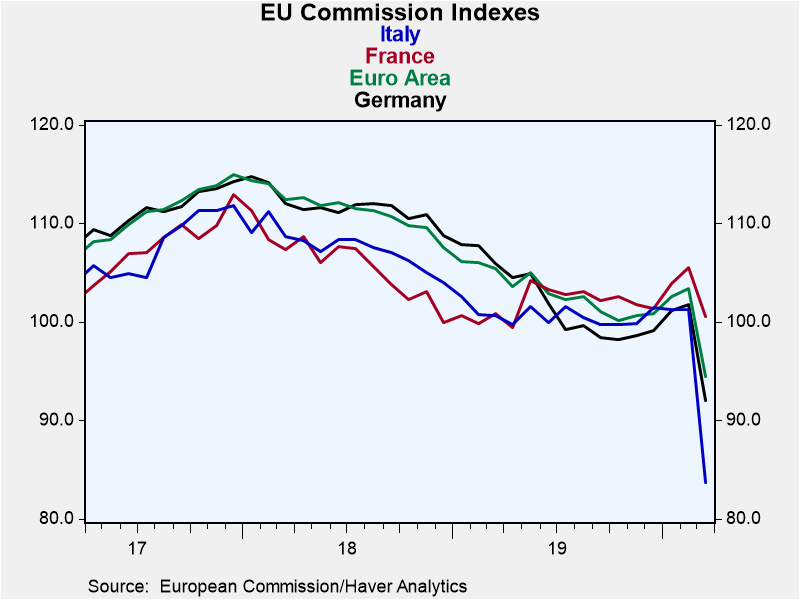 Global| Mar 30 2020
Global| Mar 30 2020EU Indexes Crash and Burn Across the Board; Construction Alone Remains Strong
Summary
With shutdowns, lockdowns, and Schengen-defying border closures at work in different places on different timelines, the one constant in the EMU is the weakness that has spread across the euro area. Activity had peaked near the end of [...]
 With shutdowns, lockdowns, and Schengen-defying border closures at work in different places on different timelines, the one constant in the EMU is the weakness that has spread across the euro area. Activity had peaked near the end of 2017 and a gradual, but persistent slowing was in place that had given way to a slow turning upward in early-2020 that has now been squashed like a bug hitting a car wind-screen at high speed. Splat! The resurgence is over.
With shutdowns, lockdowns, and Schengen-defying border closures at work in different places on different timelines, the one constant in the EMU is the weakness that has spread across the euro area. Activity had peaked near the end of 2017 and a gradual, but persistent slowing was in place that had given way to a slow turning upward in early-2020 that has now been squashed like a bug hitting a car wind-screen at high speed. Splat! The resurgence is over.
• Instead of resurgence in March, the EU Commission indexes show the largest one-month drop ever. The overall index falls to 94.5 in March from 103.4 in February; it was last weaker in August 2013.
• All 5 sectors have fallen month-to-month; construction alone retains a net positive assessment.
• Three of five sectors are below their median values (rankings below 50%) with construction as an outstanding exception and retailing as barely an exception.
• Of the 18 reporting EMU members plus the United Kingdom (19 in all) all weaken month-to-month.
• Of these 19 countries, only three small countries Greece, Cyprus and Lithuania have rank standings above their respective historic median values.
• Germany, Italy and Malta have rank standings below their respective 20th percentiles.
• Italy leads the way lower with a 17.4% drop in sentiment month-to-month.
• The five smallest monthly drops are Slovakia (-0.5%), Estonian (-0.6%), Luxembourg (-2.1%), Finland (-3.2%), and Spain (-3.3%) – the latter three monthly drops are not small.
In short, it was a bloodbath this month with no country and no sector escaping erosion and in most cases very serious erosion occurring.
Death of an upswing...

The individual sector rankings across the largest EMU economies plus the U.K. show uniformity in these trends. Construction is the only sector with a high overall standing. It also has strong standings in all these countries except in Spain, but there it still lies above a 50th percentile standing. Confidence and services are below their respective medians in all these countries (below a ranking of 50%). Industry has rankings that for the most part are exceptionally low; only France with a reading barely above 50% is an exception. Retailing was the other sector with a ranking in all of the EMU above the 50% mark. It has a ranking above 50% in Italy and Spain (still…low 50s) with weak readings in Germany and France and an even weaker reading in non-EMU member U.K. This uniformity in weakness and resilience shows that the euro area seems to be feeling the same sorts of pressures throughout.

Of course, when countries run a lock down or shelter-in-place strategy to impede the spread of a virus the impacts on activity are going to be across the board. Only essential or life-line activities are being left open. Cutting out nonessential activities has decimated the service sector across Europe. There are eerie pictures of famous tourist spots or just everyday-spots in well-known European cities that are devoid of people.
Sweden is the lone EU member country that does not have some sort of shutdown in place. It is giving people advisories. Traffic is down there too and many people are choosing to work from home. Sweden has a large number of single-person households. The authorities there also are concerned with cooping-up people and depriving them of their exercise. It will be interesting to see how Sweden fares economically and vis-a-vis virus control with these less-severe mitigation strategies in place.
As with the U.S., there is no real sense of how long ‘this’ will go on or when any modification to current policy will occur. U.S. President Donald Trump sought to end the strict U.S. shelter-in-place policy around Easter, but he has pushed that date out to April 30. At this point, any such dates are conjectural. For Europe, every country will be on a different schedule and each will be watching its borders carefully. I77 countries have been struck by this virus and in every single case- except one- it got there by making a border crossing.
Robert Brusca
AuthorMore in Author Profile »Robert A. Brusca is Chief Economist of Fact and Opinion Economics, a consulting firm he founded in Manhattan. He has been an economist on Wall Street for over 25 years. He has visited central banking and large institutional clients in over 30 countries in his career as an economist. Mr. Brusca was a Divisional Research Chief at the Federal Reserve Bank of NY (Chief of the International Financial markets Division), a Fed Watcher at Irving Trust and Chief Economist at Nikko Securities International. He is widely quoted and appears in various media. Mr. Brusca holds an MA and Ph.D. in economics from Michigan State University and a BA in Economics from the University of Michigan. His research pursues his strong interests in non aligned policy economics as well as international economics. FAO Economics’ research targets investors to assist them in making better investment decisions in stocks, bonds and in a variety of international assets. The company does not manage money and has no conflicts in giving economic advice.






